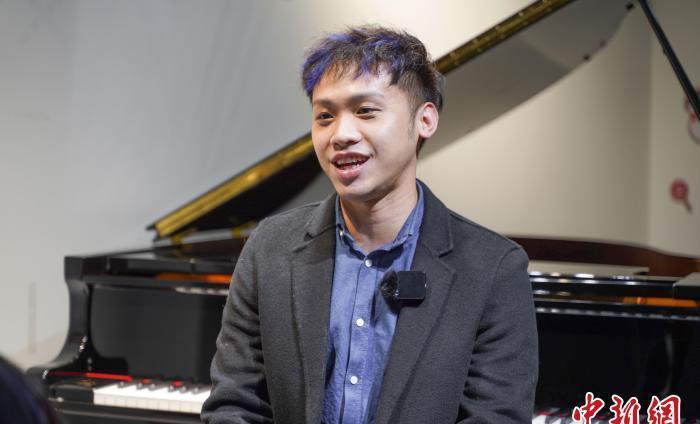
Taiqing Rong Shaoyu. Photo by Dong Yixin
Taiqing's New Year's Wish: Spread Chinese culture with music
Quzhou, February 5 (Trainee reporter Dong Yixin) "On the fifth day of the first lunar month, 'greeting the god of wealth', both sides of the strait are the same Spring Festival customs. In Quzhou, Zhejiang, Taiqing Rong Shaoyu said that the cultures on both sides of the strait are of the same origin, and the atmosphere of the Spring Festival is as strong.
Three years ago, Rong Shaoyu was introduced by his sister from Taipei to a music training institution in Quzhou as the principal.
"After coming here, I found that many places in the city are written 'Nankong Holy Land, Quzhou has a courtesy'." Rong Shaoyu said that out of curiosity and a strong interest in traditional Chinese culture, he began to try to understand the city's cultural heritage from the perspective of a music creator.
Rong Shaoyu gave lessons to the students. Photo by Dong Yixin
Quzhou is the ancestral home and second home of the descendants of the sage Confucius. At the beginning of 1129, Confucius's 48th eldest grandson, Kong Duanyou, the Duke of Yansheng, led his people to the south with Emperor Gaozong of Song. Emperor Gaozong of Song remembered his meritorious service to the south,( granted the family Quzhou and built a family temple.
"When I was in Taipei, I would go to the Confucius Temple every year, and in the past few years, I have traveled to many places in Quzhou, and the most regrettable thing is that I have not heard the exclusive voice of Nankong, so I and my friends plan to try to restore and innovate the Nankong Festival." Rong Shaoyu said that Confucius was a respected teacher in China, so he was very rigorous in his music creation.
"The Namkong culture has been passed down for many years, and its ritual music may have some changes in each dynasty, so we chose 8 of the more important chapters to restore and reproduce." Rong Shaoyu said that Nankong Festival Music is not like most people's understanding of modern music and musical scores, and many of its rhythms have symbolic significance.
To this end, Rong Shaoyu contacted the students in charge of the ritual ceremony at a Confucius Temple in Taipei, and the musicians of various ancient musical instruments, and innovated while learning.
Rong Shaoyu said: "A song of Nankong Festival Music has only 32 words, and each word is 4 beats, which is the four flat and eight stable that Chinese stress. In order to cater to the musical aesthetics of modern people, we deconstruct these sound elements and then superimpose the parts of modern electronic music. ”
Because of the lack of ancient musical instruments, the incomplete score, and the lack of deep understanding of culture, Rong Shaoyu's team has also encountered bottlenecks several times, and has been able to solve the puzzle by flipping through a large number of books, learning tea culture, and visiting many places in Quzhou.
Return to the pastoral garden - 2021 Qutai Rice Field Music Reflection Meeting. Photo by Dong Yixin
After nearly a year of hard work, Rong Shaoyu's team completed the chapter of "Greeting God" and performed at the "Return to the Countryside - 2021 Qutai Rice Field Music Reflection Meeting" held in Quzhou.
"Life in Quzhou is very comfortable, and my father will most likely settle here after he retires." Rong Shaoyu said that at present, his team has nearly 20 Taiwanese music teachers, including 4 in the mainland, and will absorb more musicians from both sides of the strait in the future to complete the restoration and innovation of the remaining seven chapters of The Nankong Festival. (End)